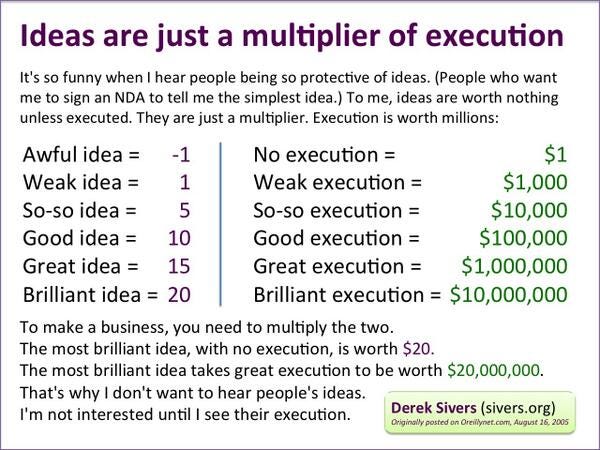VIDEO: What if you have 'too many ideas'?
Ideajam: 7 tips to help you decide which idea you should start working on
“I’ve got lots of ideas. In fact, just look at my little black notebook — literally overflowing with world-changing, industry-disrupting, home-run-hitting, unicorn-jackpot ideas.”
For those of us who enjoy playing with ideas, we’ve all been here. We feel a paralysis of action and the excuse we often of use is: ‘I’ve got too many ideas and I don’t where to start.’
The problem with this as an excuse for inaction is:
- It assumes our ideas are actually worth something before we do anything with them. Sorry, but they’re not. As Derek Sivers says: ‘Ideas are just a multiplier of execution.’

2. Simply generating ideas — even one’s that have never been attempted by anyone, ever, anywhere (they have, just not by you) — is a useless exercise if your goal is to create something of value beyond yourself.
3. It often masks a different problem — not that we have too many ideas but that we have fears around failure, imposter syndrome, or just having the confidence to do something different. These are all justifiable emotions that we need to deal with if we’re going to turn any of these ideas into some kind of reality. Otherwise its just another exciting chat about this ‘genius idea’ that will never be.
I’ve heard this all too often over the last few years working with over 300 people who are trying to decide which idea to start with.
Consider it another way: Thinking about ‘dating’ our ideas is not a blocker for most aspiring entrepreneurs. The problem is when we need to actually go on a date with just one of our ideas, even on just a few occasions, at the ‘expense’ of all the other pretty ideas. But what if the other idea was ‘the one’ we say to ourselves? The problem with this strategy is we don’t know because we haven’t tried. We have to try. We have to commit, a little. After all, a ‘one-night stand’ might just turn into a life-long partnership…
So how do we decide which to date to go first?
- THE ‘MOM TEST’
Don’t ask your Mum (or other close family member or friend) which of your ideas they think is the best. They will lie to you. Not deliberately, but they honestly don’t know (unless they’re an industry expert for your target audience) and they will tell you what they think is right for you: ‘Its wonderful, you have to do it’ or ‘Its terrible, don’t do it’ — neither is helpful. They don’t know.
2. WORK OUT THE RISKIEST ASSUMPTIONS TO TEST
Of all your ideas and the riskiest assumptions you have for each of them which one would be the easiest, cheapest and fastest to test?
Should I bake gluten free cakes (assumption: people will buy gluten free cakes) or start a school for social enterprise (assumption: people will pay for social enterprise education)?
I’ll bake the cakes. Then I’ll know whether people will buy them and whether this is something I really want to do more of, or keep it as a hobby and move on.
3. GOOD IDEA CRITERIA
Cross check all your ideas with your ‘good idea criteria’.
Your good idea criteria are your top 3 drivers in life that should be considered whenever your make a decision about a project, career direction or startup.
For example they might be:
- The idea has to be able to generate £x income within y number of months.
- The idea must allow me to be able to work remotely/flexibly all of the time.
- The idea must match my core values.
For each idea, check, do I get three big ticks against my criteria? If not, dispose the idea and move on.
4. TOOLS
Like good idea criteria but more even more practical. What tools do you currently have at your disposal?
- How much time a week do you have to work on your idea?
- How much money, if any, do you have to invest?
- How much knowledge do you have about the industry (does that matter)?
- How many potential target customers and early adopters could you easily reach through your network and communities your part of?
Cross-check all your ideas against these resources. You will be much better equipped to test some ideas over others. Start where you are.
5. TIMING
Search all the key word trends for each of your ideas on google and twitter. The one with the steepest upward trajectory wins.
6. IN THE SHOWER
Which idea do you get distracted by the most? If you’re not thinking about your idea on the loo, in the shower, on your commute, in the middle of the night…then its probably not worth pursuing.
7. DECISION MATRIX
Use our idea decision matrix to help you decide. You can put extra 'weight' on criteria that matter more to you: